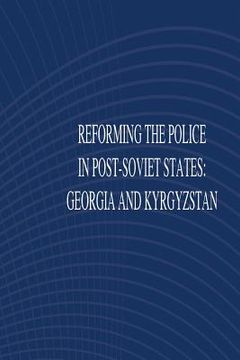Reseña del libro "Reforming the Police in Post-Soviet States: Georgia and Kyrgyztan (en Inglés)"
What does it take for a state to reform its police forces? In the post-Soviet space, the police remain one of the least-reformed government institutions, infamous for graft, collaboration with organized criminal groups, and human rights violations. The police still serve as a political instrument, even in more politically open countries. For countries that have embarked on police reform and, at the very least, sought to change the institution's name from "militsya" to "politsiya," suggesting a more Westernized understanding of the role of law-enforcement agencies, the change was made only in name, not in content. This book examines the forces driving police reform programs in former Soviet states and what leads to their success. Specifically, it examines a decade of reform efforts in Georgia and Kyrgyzstan from the perspective of political leaders, opposition forces, the homegrown nongovernmental organization community, and international actors.The two cases were chosen to show two drastically different approaches to reform played out in countries facing arguably similar problems with state-crime links, dysfunctional governments, and corrupt police forces. Both Georgia and Kyrgyzstan have undergone dramatic political transformations since the early 2000s. Both saw regimes change and political power turnovers that led to more open governments and declining corruption rates. Both have received large U.S. aid packages for democratization projects. Amid this time of far-reaching political change, the issue of police reform became a cornerstone in the fight against corruption for both Tbilisi, Georgia, and Bishkek, Kyrgyzstan.Georgia and Kyrgyzstan demonstrate that, for the change to take place, both top-down and bottom-up efforts are necessary. A political regime must feel accountable to the broader public to guide reform and destroy the Soviet legacy of a militarized police, while also introducing the public's voice into the discussion of how to proceed with the reform. Georgia and Kyrgyzstan each, however, lacked one of the two components. In Georgia, police reform programs redefined the role of the police in sustaining social order. However, these changes reflected the ideas of the educated elites, not the wider masses. The police-society dialogue is still lacking, and the possibility of future change is uncertain after Georgia elected a new parliament and appointed a new prime minister.In Kyrgyzstan, the same old political elites who came to power as a result of two regime changes in 2005 and in 2010 have been trying to change the Interior Ministry by retraining personnel and amending the legal code. Political leaders were reluctant to introduce any major changes because many of them still had lucrative informal ties with Interior Ministry personnel. After many starts and stops and regime changes in Kyrgyzstan, the pace of reform quickened only after several local nongovernmental organizations (NGOs) inserted themselves in the process of designing and overseeing the reform in 2010-13. The future of the reform is still uncertain, but its concept has become a matter of broad public discussion with several activists and NGOs involved in the process.

